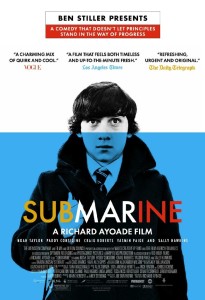
| Release Date: | June 24th, 2011 |
| Starring: | Craig Roberts, Sally Hawkins, Paddy Considine, Noah Taylor, Yasmin Paige, Darren Evans |
| Writer: | Richard Ayoade, Joe Dunthorne |
| MPAA Rating: | R |
| Director: | Richard Ayoade |
Liberally adapting from Joe Dunthorne’s celebrated novel, British sitcom star Richard Ayoade graduates from television and music video work with his stunningly accomplished debut film Submarine—a cinematic mash note to the books and films which influenced the relatively young director. A movie for those who listen to The Smiths, wear long scarves, and have seen Harold and Maude more times than they can count, Submarine takes overly-familiar clichés of the coming-of-age genre and peppers them with the vinegar wit that the British do so well, while topping it off with an arsenal of pop-poetic movie tricks.

Adding to Oliver’s look of perpetual confusion is an anti-romance with his maybe-girlfriend Jordana (Yasmin Paige). Significantly softened from the devious character in the novel, Jordana is still an acerbic antidote to the idealized pixie dreamgirls popular in American teen flicks. Her face shrouded in an imposing bob hairstyle, she is more romantic antagonist than fondly-remembered first love, yet when set to composer Alex Turner’s musical score of twee pop songs the character’s rough edges melt away and the director lets them exist in the perfect movie moment that is the “falling-in-love montage.” Here Ayoade really gets to show off the stylistic flourishes he honed in his music video projects, indulging a preternatural feel for camera placement and rhythmic editing.
Things get off course a bit in the subplot involving Oliver’s mum and the mystical lothario, but those scenes will draw the biggest laughs. As the amazingly-named Graham T. Purvis, Considine is a strong comic presence who overdoes it in his broad satirical role; whether preening in a seminar on the “prismatic colors of the soul” or practicing outdoor tantric sex, he remains a goofy, easy target and an unnecessary distraction. In these scenes, the director’s sitcom tendencies come to the fore and leave us waiting for a return to the awkward by-play between Oliver and Jordana.

[/box_info]

